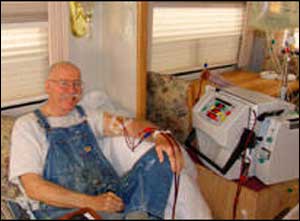- Home
- Editorial
- News
- Practice Guidelines
- Anesthesiology Guidelines
- Cancer Guidelines
- Cardiac Sciences Guidelines
- Critical Care Guidelines
- Dentistry Guidelines
- Dermatology Guidelines
- Diabetes and Endo Guidelines
- Diagnostics Guidelines
- ENT Guidelines
- Featured Practice Guidelines
- Gastroenterology Guidelines
- Geriatrics Guidelines
- Medicine Guidelines
- Nephrology Guidelines
- Neurosciences Guidelines
- Obs and Gynae Guidelines
- Ophthalmology Guidelines
- Orthopaedics Guidelines
- Paediatrics Guidelines
- Psychiatry Guidelines
- Pulmonology Guidelines
- Radiology Guidelines
- Surgery Guidelines
- Urology Guidelines
Frequent home hemodialysis has lower mortality than in-centre hemodialysis

A new study has uncovered a survival advantage associated with more frequent home hemodialysis compared with traditional hemodialysis. The findings were presented at ASN Kidney Week 2018 October 23-October 28 at the San Diego Convention Center.
Home hemodialysis (HHD) is an alternative to traditional in-center hemodialysis (IHD) performed at a dialysis facility. To compare survival rates among patients who choose these different types of dialysis when they are first beginning treatment, Eric Weinhandl, PhD, MS (NxStage Medical, Inc. and University of Minnesota, Minneapolis) and his colleagues analyzed data from the United States Renal Data System on 1,773 HHD patients and 555,366 IHD patients.
Survival after one year of follow-up was 91.7% and 81.4% in HHD and IHD patients, respectively. After adjustments, HHD patients were 23% less likely to die during follow-up than IHD patients. Dr. Weinhandl noted that this likely reflects the combined effects of better care coordination and education before dialysis initiation and better volume and pressure management due to increased hemodialysis frequency.
Within age strata, the risk of death associated with HHD was 46% lower for 20-44 years, 26% lower for 45-64 years, and 11% lower for ?65 years. Within kidney function strata, the risk of death associated with HHD was 32% lower for estimated GFR <10 mL/minute/1.73 m2 and 20% lower for estimated GFR ? 10 mL/minute/1.73 m2.
"The survival difference favoring more frequent home hemodialysis was largest in patients aged 20 to 44 years and attenuated with increasing age; however, the survival difference favoring home hemodialysis did not significantly differ across the range of estimated GFR at dialysis initiation," said Dr. Weinhandl. "Unfortunately, less than 1% of new dialysis patients were prescribed home hemodialysis."
Dr. Weinhandl added that there is growing interest in transitional care units, in which new dialysis patients may be treated with more frequent hemodialysis and are also educated about different types of dialysis, with the aim of encouraging more patients to select home dialysis. "These data support the concept of transitional care units and targeting greater utilization of home hemodialysis among new dialysis patients," he said.

Disclaimer: This site is primarily intended for healthcare professionals. Any content/information on this website does not replace the advice of medical and/or health professionals and should not be construed as medical/diagnostic advice/endorsement or prescription. Use of this site is subject to our terms of use, privacy policy, advertisement policy. © 2020 Minerva Medical Treatment Pvt Ltd